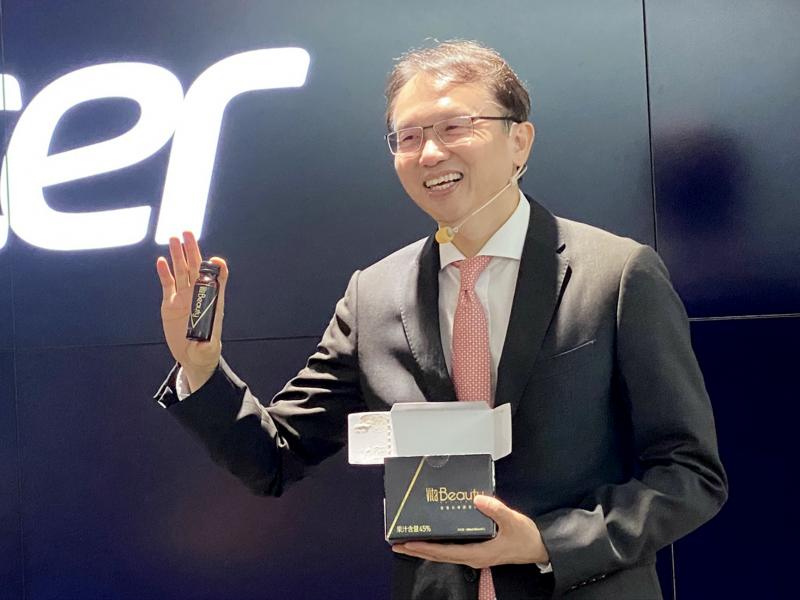Acer Inc (宏碁) yesterday said it is aiming to become a lifestyle brand following the launch of new energy drink in a livestream on Tuesday night.
The beverage, called Predator Shot, is perhaps one of the computer company’s most surprising attempts in expanding the Predator gaming line.
Seeking to repackage Acer as a lifestyle brand, the company has announced several accessories vaguely related to PCs, including a gaming inspired massage chair in collaboration with Singapore’s OSIM International Ltd (傲勝國際) and a sling bag sporting the green Acer logo.

Photo: CNA
“Our energy drink will help boost gamers’ energy and reduce fatigue resulting from too much screen time,” Acer chairman and CEO Jason Chen (陳俊聖) told a news conference at the company’s headquarters in New Taipei City, while also unveiling a collagen drink that targets female gamers.
Citing a saturated market, Chen said the company has to seek new growth beyond the PC industry.
“Forty years ago it [the PC industry] is considered a high-tech industry, but now it is no longer the case,” Chen said
“We cannot [afford to] stay in such a mature market and expect things to get better,” he added.
Still, Acer has witnessed a boom this quarter as sales over the past two months surged on the back of robust demand fostered by the growing trend for distance learning and work-from-home due to the COVID-19 pandemic.
With orders throughout the fall remaining high, the company is optimistic about its PC business in the second half of the year.
“[The increase] in demand from distance learning is phenomenal... We are having trouble satisfying up to one-third of our orders,” Acer cochief operating officer and president of corporate marketing, business planning and operations Tiffany Huang (黃資婷) said.
The imbalance between supply and demand is compounded by persistent supply chain disruptions across the PC industry, Huang said.
“As some countries remain under lockdown, some plants are unable to resume production... The delay of one component can lead to another,” she said, adding that the company is talking with suppliers to resolve shortages of components and raw materials.
China is set to become the largest growth driver for the company this year.
“Due to our relatively small presence on the Chinese market and the country’s early recovery [from the pandemic], we believe it holds great potential,” Huang said, adding that Acer is witnessing a growth rate higher than the PC industry’s average.
However, Acer’s performance in other countries across the Asia-Pacific region — including India and Indonesia — might be affected by continuous strict COVID-19 containment measures.
Last year, India and Indonesia accounted for about 25 percent of the company’s sales in the region.
Demand from the European and US markets is expected to continue on an upward trend due to their relatively rapid online migrations, the company said.

In Italy’s storied gold-making hubs, jewelers are reworking their designs to trim gold content as they race to blunt the effect of record prices and appeal to shoppers watching their budgets. Gold prices hit a record high on Thursday, surging near US$5,600 an ounce, more than double a year ago as geopolitical concerns and jitters over trade pushed investors toward the safe-haven asset. The rally is putting undue pressure on small artisans as they face mounting demands from customers, including international brands, to produce cheaper items, from signature pieces to wedding rings, according to interviews with four independent jewelers in Italy’s main

Japanese Prime Minister Sanae Takaichi has talked up the benefits of a weaker yen in a campaign speech, adopting a tone at odds with her finance ministry, which has refused to rule out any options to counter excessive foreign exchange volatility. Takaichi later softened her stance, saying she did not have a preference for the yen’s direction. “People say the weak yen is bad right now, but for export industries, it’s a major opportunity,” Takaichi said on Saturday at a rally for Liberal Democratic Party candidate Daishiro Yamagiwa in Kanagawa Prefecture ahead of a snap election on Sunday. “Whether it’s selling food or

CONCERNS: Tech companies investing in AI businesses that purchase their products have raised questions among investors that they are artificially propping up demand Nvidia Corp chief executive officer Jensen Huang (黃仁勳) on Saturday said that the company would be participating in OpenAI’s latest funding round, describing it as potentially “the largest investment we’ve ever made.” “We will invest a great deal of money,” Huang told reporters while visiting Taipei. “I believe in OpenAI. The work that they do is incredible. They’re one of the most consequential companies of our time.” Huang did not say exactly how much Nvidia might contribute, but described the investment as “huge.” “Let Sam announce how much he’s going to raise — it’s for him to decide,” Huang said, referring to OpenAI

Nvidia Corp’s negotiations to invest as much as US$100 billion in OpenAI have broken down, the Wall Street Journal (WSJ) reported, exposing a potential rift between two of the most powerful companies in the artificial intelligence (AI) industry. The discussions stalled after some inside Nvidia expressed concerns about the transaction, the WSJ reported, citing unidentified people familiar with the deliberations. OpenAI makes the popular chatbot ChatGPT, while Nvidia dominates the market for AI processors that help develop such software. The companies announced the agreement in September last year, saying at the time that they had signed a letter of intent for a strategic